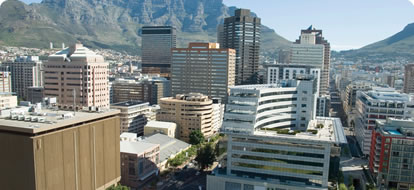Case Study: New Mobility Solutions for Cape Town, South Africa

Cape Town, South Africa
Cape Town, South Africa, sits near the southern tip of the African Continent. With a metropolitan population of more than 3 million, Cape Town is the capital of the Western Cape Province. It is also the legislative capital of South Africa, playing host to the National Parliament and many other government offices. With a spectacular setting between the sea and the mountains, Cape Town is a popular tourist destination and will be a host of the World Cup in 2010.
To prepare for the tournament, local officials are seeking to upgrade the city's transportation systems, from its aging taxi fleet to its bus and rail systems. The city also wants to build on the legacy created by the World Cup to provide solutions to persistent problems of congestion and access to mobility for the poor. Because of congestion and air-quality concerns, there is talk of policies that would restrict private transportation into the city by the end of the decade. Ford has acted as a catalyst to engage a wide range of public and private interests in planning an innovative, integrated mobility system to serve both local residents and World Cup visitors.
Innovation and Collaboration
Ford and the University of Michigan's Sustainable Mobility and Accessibility Research and Transformation (SMART) program have been working since January 2007 to develop a new mobility project in Cape Town. In January and July of 2007, Ford and its partners convened stakeholder engagement meetings. Participants included private-sector leaders, local thought leaders and government and transportation officials, as well as taxi, minibus and bike entrepreneurs. A follow-up meeting in late January 2008 confirmed plans to establish at least two "mobility hubs" in the fall of 2008, followed by eight more in time for the World Cup.
A mobility hub is a transfer point where multiple mobility options and services come together. It represents one point in a "new mobility hub network," an integrated system of hubs throughout a city that connect to provide seamless, convenient, sustainable, safe and affordable door-to-door trips for everyone - rich and poor. Hubs can be simple places where two modes of transport meet. Or they can be more elaborate and beautifully designed, connecting many transport modes and services and offering information, community services, commerce, recreation, refreshment and culture. The integrated mobility provided by hubs can be enhanced by information technology that provides real-time travel and schedule information, either at kiosks or through mobile phones.
In Cape Town, the hubs will link multiple mobility services, including buses and metro trains, minibuses, taxis, car-share vehicles and bike-share vehicles. They will also include restaurants and shops. Travelers will eventually be able to use a software device, connected through a cell phone or information kiosk, to access integrated, multi-modal, realtime travel information. To date, resources to move this project along have been provided by Ford's corporate office, Ford of South Africa and SMART (University of Michigan).
RELATED LINKS
- External Web Sites